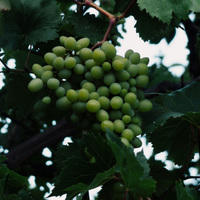Winemakers And Viniculturists Switch To Piwi Grapes Amid Climate Change
Image Source: Summer Rune / Unsplash
Winemakers switch up grape varieties nearly every year in response to a fluctuating climate conditions. Certain grape varieties react to weather changes more favorably than others, an advantage for winemakers hoping to minimize crop damage during harsh seasons. Piwi grapes, a hybrid variety, have recently become popular among viniculturists for their fungus-resistant and weather-proof properties. In European countries, centuries-old traditions and vineyard laws have prevented winemakers from accepting these hybrid Piwi varieties. “Ultimately, it’s not a debate of Vitis vinifera versus Piwi, it’s a question of what is most sustainable for the environment and will allow for viticulture in the centuries to come,” says Julianny Gómez, beverage manager at Forsythia in NYC.

The World's 40 Largest Beer Companies In 2025
Image Source: JCM / Adobe Stock
Despite tariff wars, consumption decline, and a flurry of other issues, the beer industry continued to thrive throughout 2025. BarthHaas, a German hops company, released their industry report for 2025 early this June showcasing the world's top beer companies and largest exporters. AB InBev and Heineken, which secured the number one and two spots respectively, brewed a combined total of 736.19 million hectoliters of beer. All together, the 40 largest beer companies in the world brewed a combined total of 1,638.82 million hectoliters of beer for the year, a small decrease from least year's 1,648.71 million hectoliters.

Researchers Find PFAs In Beer Causing Concerns For Brewers
Breweries might want to rethink the water they use to brew their beer, local water sources could be contaminated. PFAs, also known as forever chemicals, are polyfluoroalkyl substances. These man-made chemicals are used in manufacturing and are not fit for consumption as they do not break down in the human body. Research published in the ACS Environmental Science & Technology journal shows a direct correlation between PFAs levels in municipal drinking water and in local brews. "The test subjects were produced by U.S. brewers in areas with documented water system contamination, plus popular domestic and international beers from larger companies with unknown water sources." Breweries have water filtration systems, but they are not designed to remove PFAs.

Glass Globes Gain Popularity In Wine Vinification
Image Source: Clos Solène / Robb Report
Winemakers around the world are experimenting with new vessels for vinification. Traditionally, wine is aged in oak barrels. In more recent years, producers have experimented with vessels such as clay pots and concrete eggs, which seal oxygen away completely, making them ideal for aging wine. Glass is 100% non-porous, so punchy fruit flavors are retained longer in the vinification process. “It’s like taking a fresh fruit you’ve just cut and keeping it just as fresh smelling and tasting for 12 months,” says winemaker Guillaume Fabre. As of now, Wineglobes are being used by 20 wineries in U.S.A., and nearly 500 around the world.

What A 200% Tariff On EU Alcohol Could Mean For The Industry
Image Source: Barmalini / Stock.Adobe.Com
This month, President Trump threatened the European Union with a 200% tariff on all imported wines and spirits. The announcement came in response to the EU's proposed 50% American whiskey tax. “If this Tariff is not removed immediately, the U.S. will shortly place a 200% Tariff on all WINES, CHAMPAGNES, & ALCOHOLIC PRODUCTS COMING OUT OF FRANCE AND OTHER E.U. REPRESENTED COUNTRIES,” Trump said in a Truth Social post. European alcohol exports to the U.S surpassed $5 billion in 2024, and the proposed tariff would devastate the country's alcohol exports industry. “The U.S.-EU spirits sector is the model for fair and reciprocal trade, having zero-for-zero tariffs since 1997,” said Distilled Spirits Council President and CEO Chris Swonger. "We urge President Trump to secure a spirits agreement with the EU to get us back to zero-for-zero tariffs, which will create U.S. jobs and increase manufacturing and exports for the American hospitality sector. We want toasts not tariffs.”
